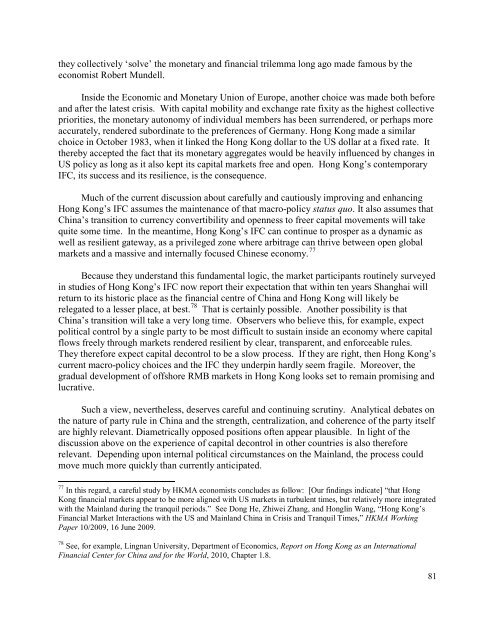Hong Kong's International Financial Centre: Retrospect and Prospect
Hong Kong's International Financial Centre: Retrospect and Prospect
Hong Kong's International Financial Centre: Retrospect and Prospect
Create successful ePaper yourself
Turn your PDF publications into a flip-book with our unique Google optimized e-Paper software.
they collectively ‘solve’ the monetary <strong>and</strong> financial trilemma long ago made famous by the<br />
economist Robert Mundell.<br />
Inside the Economic <strong>and</strong> Monetary Union of Europe, another choice was made both before<br />
<strong>and</strong> after the latest crisis. With capital mobility <strong>and</strong> exchange rate fixity as the highest collective<br />
priorities, the monetary autonomy of individual members has been surrendered, or perhaps more<br />
accurately, rendered subordinate to the preferences of Germany. <strong>Hong</strong> Kong made a similar<br />
choice in October 1983, when it linked the <strong>Hong</strong> Kong dollar to the US dollar at a fixed rate. It<br />
thereby accepted the fact that its monetary aggregates would be heavily influenced by changes in<br />
US policy as long as it also kept its capital markets free <strong>and</strong> open. <strong>Hong</strong> Kong’s contemporary<br />
IFC, its success <strong>and</strong> its resilience, is the consequence.<br />
Much of the current discussion about carefully <strong>and</strong> cautiously improving <strong>and</strong> enhancing<br />
<strong>Hong</strong> Kong’s IFC assumes the maintenance of that macro-policy status quo. It also assumes that<br />
China’s transition to currency convertibility <strong>and</strong> openness to freer capital movements will take<br />
quite some time. In the meantime, <strong>Hong</strong> Kong’s IFC can continue to prosper as a dynamic as<br />
well as resilient gateway, as a privileged zone where arbitrage can thrive between open global<br />
markets <strong>and</strong> a massive <strong>and</strong> internally focused Chinese economy. 77<br />
Because they underst<strong>and</strong> this fundamental logic, the market participants routinely surveyed<br />
in studies of <strong>Hong</strong> Kong’s IFC now report their expectation that within ten years Shanghai will<br />
return to its historic place as the financial centre of China <strong>and</strong> <strong>Hong</strong> Kong will likely be<br />
relegated to a lesser place, at best. 78<br />
That is certainly possible. Another possibility is that<br />
China’s transition will take a very long time. Observers who believe this, for example, expect<br />
political control by a single party to be most difficult to sustain inside an economy where capital<br />
flows freely through markets rendered resilient by clear, transparent, <strong>and</strong> enforceable rules.<br />
They therefore expect capital decontrol to be a slow process. If they are right, then <strong>Hong</strong> Kong’s<br />
current macro-policy choices <strong>and</strong> the IFC they underpin hardly seem fragile. Moreover, the<br />
gradual development of offshore RMB markets in <strong>Hong</strong> Kong looks set to remain promising <strong>and</strong><br />
lucrative.<br />
Such a view, nevertheless, deserves careful <strong>and</strong> continuing scrutiny. Analytical debates on<br />
the nature of party rule in China <strong>and</strong> the strength, centralization, <strong>and</strong> coherence of the party itself<br />
are highly relevant. Diametrically opposed positions often appear plausible. In light of the<br />
discussion above on the experience of capital decontrol in other countries is also therefore<br />
relevant. Depending upon internal political circumstances on the Mainl<strong>and</strong>, the process could<br />
move much more quickly than currently anticipated.<br />
77 In this regard, a careful study by HKMA economists concludes as follow: [Our findings indicate] “that <strong>Hong</strong><br />
Kong financial markets appear to be more aligned with US markets in turbulent times, but relatively more integrated<br />
with the Mainl<strong>and</strong> during the tranquil periods.” See Dong He, Zhiwei Zhang, <strong>and</strong> <strong>Hong</strong>lin Wang, “<strong>Hong</strong> Kong’s<br />
<strong>Financial</strong> Market Interactions with the US <strong>and</strong> Mainl<strong>and</strong> China in Crisis <strong>and</strong> Tranquil Times,” HKMA Working<br />
Paper 10/2009, 16 June 2009.<br />
78 See, for example, Lingnan University, Department of Economics, Report on <strong>Hong</strong> Kong as an <strong>International</strong><br />
<strong>Financial</strong> Center for China <strong>and</strong> for the World, 2010, Chapter 1.8.<br />
81


